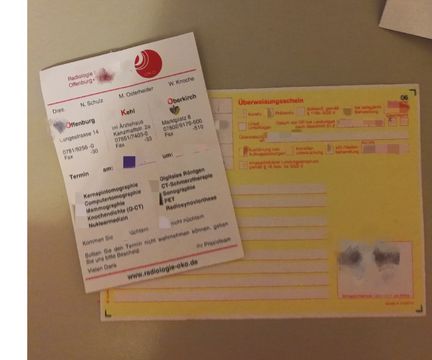How visiting a doctor in Germany works
Not many I know enjoy going to the doctor’s, and certainly not me. I never like making trips to hospitals, and would only make that trip if I didn’t have another option.
A while ago, I was put into that situation when a cold and cough I had turned a tad bit nastier than usual. I was forced to discover a suitable practice and figure out how visiting a doctor in Germany worked. It was certainly quite different from how it worked back home.
I first went on Google to search for English speaking doctors. My search returned three results. When I tried to place a phone call to one of the three practices, there was a lot of German happening on the other side of the phone which I tried desperately to understand but in the end gave up and phoned another doctor. A very, very friendly assistant picked up and said she could speak English. After giving her my insurance number and briefly telling her what was wrong, she set up an appointment for me and gave me a time slot to come by. She was so kind, she instantly made me feel better about my condition.
I had never been to the area where the medical practice was located before, but it was very easy to find. And it was situated in a gorgeously beautiful area. The architecture was so lovely – it felt like walking through an old story book.
The nurses at the medical practice couldn’t be any more helpful and friendly. It was the most pleasant experience. I had to wait about 30 minutes more than was necessary because there had been an emergency situation so appointments were put back, but because of how lovely everything was, those 30 minutes weren’t a problem. When it was finally my turn, my doctor did a quick examination and suggested an x-ray for which I had to visit a radiologist at a different place.
To be able to visit a radiologist, the doctor gave me a paper called “Überweisungsschein” which has your name, insurance number, the diagnosis and the test you need to do. I then had to take this with me to a radiology center to make an appointment for the test to be done. After the test is done, the radiologist will send your test report to the practice that recommended the test and you then make an appointment with the practice to learn about the result of the test. Very interesting! Because back home all this happened in one place, in one hospital (probably different floors) but definitely one place and could all be done in one single day.
To sum up my very first experience of visiting a medical practice in Germany, I’d say it was pretty good and wasn’t scary at all. The staff are always warm and friendly and my doctor is also very kind, always explaining test results to me and recommending further tests with a lot of patience.
I feel like a lot of students might find the process a bit daunting or confusing, and my blog post probably wasn’t as clear as I wanted it to be so below are the steps for visiting a medical practice.
- Call them up (or visit them) to make an appointment
- Go to the practice at the time slot allocated to you
- If the doctor recommends you to take extra tests or visit another hospital, she will give you a piece of paper which you show at the other hospital
- If the doctor prescribes medicines for you, she will also give you a piece of paper, which you show at the pharmacy to get your medicines (there is usually a co-payment for medicines, which means you have to pay for the medicines)
Stay safe and healthy! ❤️


Good afternoon, I completed my MBBS and planning to do pg in Germany.please guide me
Hi, Medicine and dentistry in Germany is taught under the German "State Examination" and takes six years. There are no postgraduate courses for medicine or dentistry in Germany because these subjects are not split into a bachelor’s and a master’s degree. Also, there are no courses offered in English, so you will need a very high German proficiency to complete the programme and pass the examinations. A number of universities offer Master's courses in medicine. These are research-based postgraduate courses and are not primarily focused on training students to work as doctors in Germany. Examples of these courses are the Master of Science in Molecular Biology at the University of Göttingen, the Master of Science in Experimental and Clinical Neurosciences at the University of Regensburg and the Master's programme in International Health at the Charité Hospital in Berlin. To get a first general overview of the topic, please read on here 👉 https://www.study-in-germany.de/en/plan-your-studies/study-options/programme/medical-studies-and-specialist-training/. Also, you may have a look at this website, where you can find helpful comments on medicine in Germany. The website is designed to help doctors and other interested users learn about "Health system in Germany". It also provides the addresses of university hospitals in Germany 👉 https://www.medknowledge.de/site-map/articles/269-germany/2869-medicine-in-germany-overview.html. If you have any further questions, please contact us by email using our contact form 👉 https://www.study-in-germany.de/en/get-in-touch/contact/. Best wishes, Your Study in Germany-Team 👋🇩🇪
I like study medicin
Hi Abdullah, Medicine and dentistry in Germany is taught under the German "State Examination" and takes six years. There are no postgraduate courses for medicine or dentistry in Germany because these subjects are not split into a bachelor’s and a master’s degree. Also, there are no courses offered in English, so you will need a very high German proficiency to complete the programme and pass the examinations. To get a first general overview of the topic, please read on here 👉 https://www.study-in-germany.de/en/plan-your-studies/study-options/programme/medical-studies-and-specialist-training/. Also, you may have a look at this website, where you can find helpful comments on medicine in Germany. The website is designed to help doctors and other interested users learn about "Health system in Germany". It also provides the addresses of university hospitals in Germany 👉 https://www.medknowledge.de/site-map/articles/269-germany/2869-medicine-in-germany-overview.html. Best wishes, Your Study in Germany-Team 👋🇩🇪
Radiograper
Send me a schoolarship medical school thankyou
Hi Jenny, unfortunately, it is not possible to receive funding for study programmes under state examination, as it is common for medical studies in Germany. But the DAAD offers Research Grants for doctoral studies and research. More information about our scholarship programmes can be found in the DAAD scholarship database at: www.funding-guide.de. The DAAD scholarship database also provides information about scholarship programmes offered by other organisations. In case you have questions about these programmes, please contact the respective organisation directly. Good luck and best wishes, Your Study in Germany Team 🇩🇪👋
This blog was extremely useful. I really appreciate your kindness in sharing this with me and everyone else!
Hey There Nice content you have here it was really helpful And Here I have written a blog on How To Become Doctor In Germany? Check Now https://postpear.com/how-to-become-doctor-in-germany-from-india/
Hi, Please reply to this email, so we can talk further. Thank you Crystal Stanton
Always heard of Germany's magnificent buildings, people and culture. It also being a conductive place for students. I want to study there but don't have anyone to consult don't know if anyone can help me out so as to communicate and know how I can work it out to further my Bsc there thanks!
Hi Mazino! Germany is a beautiful place to study. You are right :) When I was looking for suitable programs to enroll in, I used the DAAD website to help me. https://www.daad.de/deutschland/studienangebote/international-programmes/en/?p=d&s=kr&id=168 You can try using the DAAD database to find a program that suits you. Goodluck! ◕◡◕
Hi, as a first step, have a look at our guideline on https://www.study-in.de/en/service/ten-steps-to-studying-in-germany_28447.php. You will find important steps, links and tips for studying in Germany. Best wishes, your Study in Germany Team